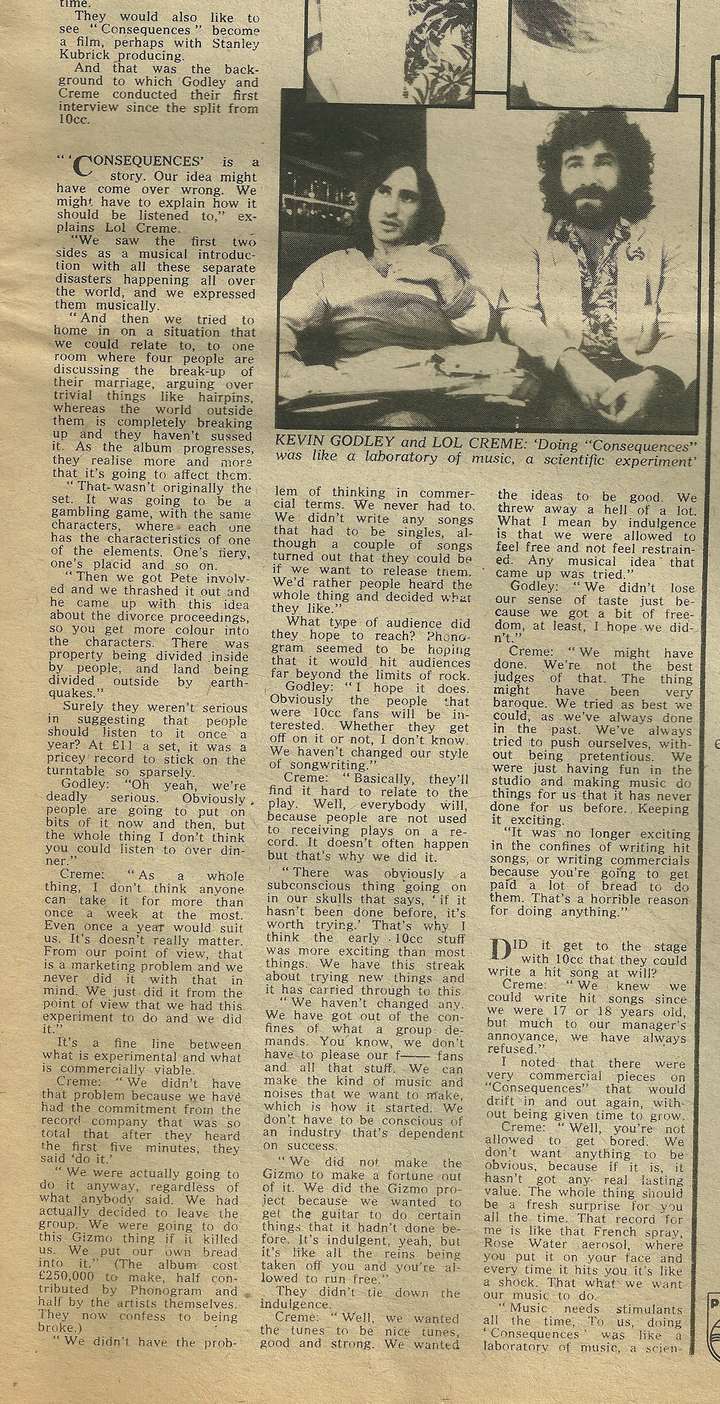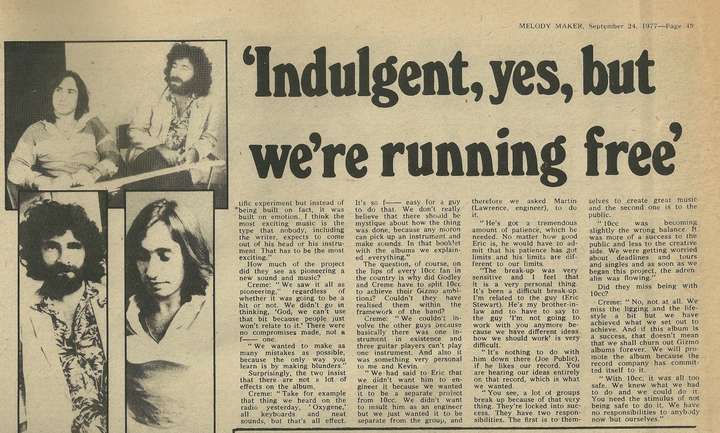
Melody Maker, 1977
The things we do for Art
Melody Maker, 24 September 1977
Godley and Creme, whose invention of the Gizmo split 10cc, give their first interview since the break to Harry Doherty
I first heard about it in Manchester last November, in the loo at Slack Alice’s to be exact. Lol Creme, inebriated after being designated as Brian Robertson’s drinking partner for the night, mumbled something about a triple Gizmo album.
Knowing Creme to be the frivolous type and not averse to stitching up journalists, and presuming that the original 10cc was still intact, I reckoned that he and Kevin Godley were in fact working on a single Gizmo album, but he was adamant. “I tell you, it’s a triple. No joking,” he emphasised through the alcoholic haze.
Then 10cc split. And Creme and Godley have remained silent, industriously developing their labour of love, which eventually took 15 months in all to record.
Godley and Creme hid themselves away in two studios: Strawberry, in Stockport, and the Manor Studios, outside Oxford, working about 18 hours a-day, seven days a week, driving themselves to the limits.
Deadlines for their album, which by now had been titled “Consequences,” came and went. Stories of its strangeness circulated.
First, there was the funny tale of a Phonogram executive who went down to the studio to listen to the album and was left alone in the control room, in the dark, with the volume turned high. He came out screaming and shaking.
Godley and Creme confirm the story. They didn’t let him go home, though. He was locked in the studio until the album had finished.
Then came the news that Peter Cook had become involved, and nobody could quite suss out what his role would be. Hardly the Derek and Clive characterisation?
Cook stayed with Godley and Creme for three months at the Manor Studios, writing and recording his lengthy pieces. Godley and Creme now reckon they have enough material, recorded in the early hours in a drunken stupor, to bootleg an album similar to Derek and Clive, with Cook hilariously knocking, among other people, his little buddy Dud.
And, finally, the addition of jazz singer Sarah Vaughan to the album. On one track, “Lost Weekend,” the lyrics demanded a duet, and after Godley had sung his part, they decided that Sarah Vaughan would be perfect.
Ken Maliphant, from Phonogram, brought her down to the Manor Studios and she did her vocal in three takes, the fastest bit of recording on the album.
The backing track, incidentally, had taken something like 10 weeks to record. Godley and Creme modestly estimate that it is Miss Vaughan’s finest moment on record in years.
The split with 10cc was never as amicable as initial reports made out. Godley and Creme had been growing more and more disillusioned with the path the band was taking. A split had been on the cards for some time.
The ironic thing is that, at one stage, it looked as if Creme and Godley would retain the 10cc name. Stewart had left the band and Gouldman was involved in the Gizmo project with the other two.
Then Stewart decided to rejoin, and from then on it seemed inevitable to both Creme and Godley that they would have to leave the band to fulfil ambitions for their invention.
They hotly dispute claims by Stewart that, as engineer, he was responsible for the 10cc sound and so was entitled to keep the name. “An engineer is only as good as the group,” Creme said. “ Eric would have left a lot of things had we not decided to push them even further for the best sound.”
And so onto the Gizmo, the instrument that caused the split. It was invented about six years ago, before 10cc formed, by Godley and Creme and given to one John McConnell, a lecturer in physics at Manchester University of Science and Technology, to perfect.
The instrument is designed to cover a wide range of sounds, from orchestra strings to brass. The intention of “Consequences” was to demonstrate the potential of the Gizmo.
Godley and Creme had originally gone into the studio for three days to experiment with the Gizmo, but from there they realised just how much they could achieve dnd their project grew.
“It was just a mass of experiments to see how many different ways we could make the Gizmo sound,’ said Creme.
This, then, was the foundation on which “Consequences” was built. From wishing to merely display the expanse of their baby, Godley and Creme decided to make an album that would also be a first in recording.
They would do a play on disc, complete with story and hence the arrival of story-teller and character-player Peter Cook. Creme explains:
“It was all experiments. As we could make the Gizmo do just about everything, it seemed a good idea to make it enhance vocals, not sung vocals but the spoken word. We had a story in mind. If you listen to the album carefully, for every line that Peter says there’s some kind of musical expression helped by the Gizmo.”
And thus, over the 16-month period, all manner of recording techniques were adapted to get the desired sound, and you may not believe the lengths Godley and Creme went to to achieve their wishes.
For instance:
- To get the full effect of a fireworks display on tape, a night was spent in a field in Stockport (with the permission of the local county council) recording fireworks being shot, one by one, in the air.
- To get the sound of a tidal wave on one track, a night was spert slinging over 200 bucketfuls of water against the wall of Strawberry Studios.
As Creme teils it: “There is a story behind every single note played on that album.”
Where, 10cc fans would like to know, is Godley and Creme’s experimentation going to end? The answer is that it goes on and on. For the future, they may take the “Consequences” project on a lecture tour of universities.
They would take a facsimile of their studio on the road with them and invite people to make their own recordings.
There is also another project in hand, which would involve another invention, nothing to do with music, and taking up three years of their time.
They would also like to see “Consequences” become a film, perhaps with Stanley Kubrick producing.
And that was the background to which Godley and Creme conducted their first interview since the split from 10cc.
“‘Consequences’ is a story. Our idea might have come over wrong. We might have to explain how it should be listened to,” explains Lol Creme.
“We saw the first two sides as a musical introduction with all these separate disasters happening all over the world and we expressed them musically.
“And then we tried to home in on a situation that we could relate to, to onecroom where four people are discussing the break-up of their marriage, arguing over trivial things like hairpins, whereas the world outside them is completely breaking up and they haven’t sussed it. As the album progresses, they realise more and more that it’s going to affect them.
“That wasn’t originally the set. It was going to be a gambling game, with the same characters, where each one has the characteristics of one of the elements. One’s fiery,
one’s placid and so on.
“Then we got Pete involved and we thrashed it out and he came up with this idea about the divorce proceedings, so you get more colour into the characters. There was property being divided inside by people, and land being divided by earthquakes.”
Surely they weren't serious in suggesting that people should listen to it once a year? At £11 a set, it was a pricey record to stick on the turntable so sparsely.
Godley: “Oh yeah, we’re deadly serious. Obviously people are going to put on bits of it now and then, but the whole thing I don’t think you could listen to over dinner.”
Creme “As a whole thing, I don’t think anyone can take it for more than once a week at the most. Even once a year would suit us. It's doesn’t really matter. From our point of view, that is a marketing problem and we never did it with that in mind. We just did it from the point of view that we had this experiment to do and we did it.”
It’s a fine line between what is experimental and what is commercially viable.
Creme: “We didn’t have that problem because we have had the commitment from the record company that was so total that after they heard the first five minutes, they said ‘do it.’
“We were actually going to do it anyway, regardless of what anybody said. We had actually decided to leave the group. We were going to do this Gizmo thing if it killed us. We put our own bread into it.” (The album cast £250,000 to make, half contributed by Phonogram and half by the artists themselves. They now confess to being broke.)
KEVIN GODLEY and LOL CREME: ‘Doing “Consequences” was like a laboratory of music, a scientific experiment’
“We didn't have the problem of thinking in commercial terms. We never had to. We didn’t write any songs that had to be singles, although a couple of songs turned out that they could be if we want to release them. We'd rather people heard the whole thing and decided what they like.”
What type of audience did they hope to reach? Phonogram seemed to be hoping that it would hit audiences far beyond the limits of rock.
Godley: “I hope it does. Obviously the people that were 10cc fans will be interested. Whether they get off on it or not, I don’t know. We haven't changed our style of songwriting.”
Creme: “Basically, they'll find it hard to relate to the play. Well, everybody will, because people are not used to receiving plays on a record. It doesn’t often happen but that’s why we did it.
“There was obviously a subconscious thing going on in our skulls that says, ‘if it hasn't been done before, it’s worth trying.’ That’s why I think the early 10cc stuff was more exciting than most things. We have this streak about trying new things and it has carried through to this.
“We haven’t changed any. We have got out of the confines of what a group demands. You know, we don’t have to please our f– fans and all that stuff. We can make the kind of music and noises that we want to make, which is how it started. We don’t have to be conscious of an industry that’s dependent on success.
“We did not make the Gizmo to make a fortune out of it. We did the Gizmo project because we wanted to get the guitar to do certain things that it hadn’t done before. It’s indulgent, yeah, but it’s like all the reins being taken off you and you're allowed to run free.’
They didn’t tie down the indulgence.
Creme: “Well, we wanted the tunes to be nice tunes, good and. strong. We wanted the ideas to be good. We threw away a hell of a lot. What I mean by indulgence is that we were allowed to feel free and not feel restrained. Any musical idea that came up was tried.”
Godley: “We didn’t lose our sense of taste just because we got a bit of freedom, at least, I hope we didn’t.”
Creme: “We might have done. We’re not the best judges of that. The thing might have been very baroque. We tried as best we could, as we've always done in the past. We’ve always tried to push ourselves, without being pretentious. We were just having fun in the studio and making music do things for us that it has never done for us before. Keeping it exciting.
“It was no longer exciting in the confines of writing hit songs, or writing commercials because you’re going to get paid a lot of bread to do them. That’s a horrible reason for doing anything.”
Did it get to the stage with 10cc that they could write a hit song at will?
Creme: “We knew we could write hit songs since we were 17 or 18 years old, but much to our manager’s annoyance, we have always refused.”
I noted that there were very commercial pieces on “Consequences” that would drift in and out again, without being given time to grow.
Creme: “Well, you’re not allowed to get bored. We don’t want anything to be obvious, because if it is, it hasn't got any real lasting value. The whole thing should be a fresh surprise for you all the time. That record for me is like that French spray, Rose Water aerosol, where you put it on your face and every time it hits you it's like
a shock. That what: we want our music to do.
“Music needs stimulants all the time. To us doing ‘Consequences’ was like a laboratory of music, a scientific experiment but instead of being built on fact, it was built on emotion. I think the most exciting music type that nobody, including the writer, expects to come out of his head or his instrument. That has to be the most exciting.”
Indulgent yes, but we’re running free
How much of the project did they see as pioneering a new sound and music?
Creme: “We saw it all as pioneering,” regardless of whether it was going to be a hit or not. We didn’t go in thinking, ‘God, we can’t use that bit because people just won’t relate to it.’ There were no compromises made, not a f--- one.
“We wanted to make as many mistakes as possible, because the only way you learn is by making blunders.”
Surprisingly, the two insist that there are not a lot of effects on the album.
Creme: “Take for example that thing we heard on the radio yesterday, ‘Oxygene,’ all keyboards and neat sounds, but that’s all effect. It’s so f--- easy for a guy to do that. We don’t really believe that there shouid be mystique about how the thing was done, because any moron can pick up an instrument and make sounds. In that booklet with the albums we explained everything.”
The question, of course, on the lips of every 10cc fan in the country is why did Godley and Creme have to split 10cc to achieve their Gizmo ambitions? Couldn’t they have realised them within the framework of the band?
Creme: “We couldn’t involve the other guys because basically there was one instrument in existence and three guitar players can’t play one instrument. And also it was something very personal to me and Kevin.
“We had said to Eric that we didn’t want him to engineer it because we wanted it to be a separate project from 10cc. We didn’t want to insult him as an engineer but we just wanted it to be separate from the group, and therefore we asked Martin (Lawrence, engineer), to do it.
“He’s got a tremendous amount of patience, which he needed. No matter how good Eric is, he would have to admit that his patience has got limits and his limits are different to our limits.
“The break-up was very sensitive and I feel that it is a very personal thing. It’s been a difficult break-up. I’m related to the guy (Eric Stewart). He’s my brother-in-law and to have to say to the guy ‘I’m not going work with you anymore because we have different ideas how we should work’ is very difficult.
“It’s nothing to do with him down there (Joe Public), if he likes our record. You are hearing our ideas entirely on that record, which is what we wanted.
“You see, a lot of groups break up because of that very thing. They’re locked into success. They have two responsibilities. The first is to themselves to create great music and the second one is to the public.
“10cc was slightly the wrong balance. It was more of a success to the public and less to the creative side. We were getting worried about deadlines and tours and singles and as soon as we began this project, the adrenalin was flowing.”
Did they miss being with 10cc?
Creme: “No, not at all. We miss the ligging and the life-style a bit but we have achieved what we set out to achieve. And if this album is a success, that doesn’t mean that we shall churn out Gizmo albums forever. We will promote the album because the record company has committed itself to it.
“With 10cc, it was all too safe. We knew what we had to do and we could do it. You need the stimulus of not being safe to do it. We have no responsibilities to anybody
now but ourselves.”
Huge thanks to Paul Hamilton for sending me these scans of Melody Maker interviews and reviews from the time of Consquences' orginal release.



